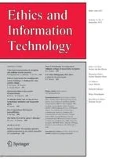Abstract
Let us show how property is grasped as an institutional fact. If Jones steals a computer, he does not own it in the sense of property, but only exercises control towards it. If he buys the computer, he controls it too, and moreover owns it in the sense of property. In other words, simply exercising control towards something is a brute fact. This control counts as property only in a certain context: the computer counts as Jones’s property only if he got it through a licit transfer. This is why property is not a brute fact, and is therefore an institutional fact. The same kind of reasoning applies to privacy. When a personal information P about Jones is openly diffused, it seems that P becomes public. From this point of view, a violation of privacy equates to a publication. The problem about this account is the following: who would call “publication of a book” the hacking of it on its author’s computer? No one, because the word “publication” is an institutional word that only refers to a licit diffusion. Considering this answer, we may conclude as follows: if the diffusion of P is illicit, P still counts as private, even if everyone knows about it. If that conclusion is true, privacy is an institutional fact.
Similar content being viewed by others
Notes
This opposition corresponds to the Roman opposition between imperium (public power) and patria potestas (private power).
The right to privacy considered in the sense of a constitutive rule can not be reduced to the right to property. But Thomson is still right about regulative rules: the laws that protect privacy are a cluster of the laws that protect property, because they regulate the use of sensible objects: pieces of information.
Even if one defends a naturalistic account of property, as Locke (1970, chap. V) does, one still needs an institutional account of it: natural property needs to be guaranteed by the State in order to exist concretely, which means it needs to be institutionalized.
For Gavison, “the obvious dimension of privateness/publicness is that of being known. The more widely known an item of information is, the more "public" it seems and vice versa” (p. 114). For Parent, “Such information is available to the public; any one of us can look it up” (p. 307).
References
Benn, S., & Gaus, G. (1983). The public and the private : Concepts and action. In S. Benn & G. Gaus (Eds.), Public and private in social life (pp. 3–27). London: Croom Helm.
Gavison, R. (1983). Information control: Availability and exclusion. In S. Benn & G. Gaus (Eds.), Public and private in social life (pp. 113–134). London: Croom Helm.
Gavison, R. (1984). Privacy and the limits of law. In F. Schoeman (Ed.), Philosophical dimensions of privacy (pp. 346–402). Cambridge: Cambridge University Press.
Locke, J. (1970). Two treatises of Government. (P. Laslett Ed.), Cambridge: Cambridge University Press.
Parent, W. (1983). A new definition of privacy for the law. Law and Philosophy, 2(3), 305–338.
Plato (2004). The republic. (C. D. C. Reeve Ed.), Indianapolis: Hackett.
Searle, J. (1995). The construction of social reality. New York: Free Press.
Thomson, J. (1984). The right to privacy. In F. Schoeman (Ed.), Philosophical dimensions of privacy (pp. 272–289). Cambridge: Cambridge University Press.
Warren, S., & Brandeis, L. (1984). The right to privacy: The implicit made explicit. In F. Schoeman (Ed.), Philosophical dimensions of privacy (pp. 75–103). Cambridge: Cambridge University Press.
Acknowledgments
I would like to thank Prof. Daniel Schulthess (University of Neuchatel), who raised the issues that I discuss in my paper.
Author information
Authors and Affiliations
Corresponding author
Additional information
Marc-André Weber: Formerly in University of Neuchatel, Institut de philosophie, Espace Louis-Agassiz 1, 2000 Neuchatel, Switzerland.
Rights and permissions
About this article
Cite this article
Weber, MA. Privacy: an institutional fact. Ethics Inf Technol 18, 59–64 (2016). https://doi.org/10.1007/s10676-016-9391-3
Published:
Issue Date:
DOI: https://doi.org/10.1007/s10676-016-9391-3




